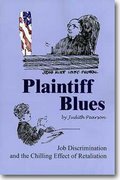When Congress passed (with both Republican and Democratic support) and President Bush signed the Military Commission Act of 2006, I despaired for civil liberties in our country. Two branches of our government had stripped away the most essential human right, the writ of habeas corpus. So fundamental that the founding fathers included it within the text of the U.S.Constitution itself. With the MCA, two branches of our government failed the basic test of civil liberties. That high-stakes test occurs whenever there are threatening or frightening events, when the balance between security and liberty is most fragile. 9/11 was such a test and we failed. As I wrote in July and November 2007, it's when we fail these tests of our fundamental principles that the terrorists win.
I remember a Phil Ochs tune we listened to in the 60s. Knock on the Door included timeless lyrics: "In many a time, in many a land, it all began with that knock on the door. Now there's many new words and many new names, the banners have changed but the knock is the same. And open your eyes and see what they do, when they knock over there, friend, they're knocking for you." John F. Kennedy said, "The rights of every man are diminished when the rights of one man are threatened." We better protect our liberty today. Who's to say what knocks tomorrow will bring - and for whom?
Finally, on Thursday, June 12, 2008, the U.S.Supreme Court ruled by a narrow, 5-4 margin, that the habeas corpus provision in the Military Commission Act is unconstitutional. Our precious system of check and balances proves up again. But by just one vote! No more cavalier attitudes toward appointments to the Supreme Court when the write of habeas corpus hangs by one vote!
However, Justice Scalia's dissent in the case sent shivers down my spine. He wrote, "It will most certainly cause more Americans to be killed." That has to be one of the most injudicious comments by a sitting Supreme Court Justice ever! Such fear mongering is the purview of politicians, whose rhetoric is directly related to their next election, not Supreme Court Justices appointed for life.
Sunday, June 15, 2008
Saturday, June 7, 2008
Concerns about School Choice
In my 34 years as a public educator, both teacher and administrator, my experiences with school choice were in smaller or rural public schools in NE Minnesota. However, my concerns about school choice relate to public education in general. I wrote Myths of Educational Choice (Praeger 1993) to fully describe the complex social, political, and economic issues related to school choice. My concerns apply to all the across-the-board, unrestricted Minnesota choice programs, including PSEO (Post Secondary Enrollment Options), open enrollment, and charter schools. The theory behind school choice is that competition will force public school to improve. By definition, competition means winners and losers. A brief look at the winners and losers in school choice highlights my concerns.
Who are the winners? Those students/parents who chose out of educational necessity win. They are gifted or talented students who have run out of the curricular choices in their home district. Those qualified few may benefit from the PSEO program or enrollment in a larger school district with more advanced curricular choices. Why not limit PSEO options to highly qualified students rather than open the floodgates for students/parents looking for two free years of college, whether they are ready and able or not! Why not limit open enrollment to educational need rather than introduce chaos into our entire public education system, which is the bedrock of our democracy?
Other winners may include troubled or failing students who just need a second chance or a different approach. However, there were many alternative programs prior to Minnesota's school choice legislation, so this is no justification for wholesale school choice programs.
Neighboring school districts win when students chose because the get the windfall profits as the state aids follow student enrollment. Schools now have to allocate precious resources to advertise and recruit for enrollments.
Taxpayer groups and politicians win with school choice because choice is cheap! They can proclaim choice as reform and a way to improve public schools, without providing adequate and equitable funding for public schools.
However, the losers in school choice are my primary concern. Too many students leave their resident school for reasons that have nothing to do with a better education. They go to college before they are ready and then fail to graduate with their class. When parents/students leave for casual or temporary reasons like romance, athletics, proximity to after school jobs, or parents daycare convenience, community commitment and connection is lost. Worse yet, many students lose educational progress when unregulated charter schools fail due to mismanagement.
But students who stay behind are the big losers. Many of these parents/students have no choice. Economics or geography keep them trapped in their losing local schools. These schools are forced to cut programs and increase class sizes to balance budgets decimated by lost foundation aids that follow the students leaving.
The losing school districts can't pass revenue referendums when voters' kids attend neighboring schools. For example, St. Louis County School District voters rejected the last two revenue referendums by 226 votes in 2006 and 402 votes in 2007. This is a geographically huge, consolidated district in NE Minnesota. It is bordered by 19 neighboring school districts and four post-secondary institutions. Could these failed referendums be due to the fact that over 600 resident students do not attend district schools? That number represents annual revenue losses of close to $4 million. Why vote to raise your school taxes when your kids are not attending their local public school?
In brief, while a few may benefit from school choice, their choices diminish the choices and quality of education for the majority who don't or can't choose. It's important to note here that neighboring districts or charter schools are not required to accept and educate all students as are resident districts. Thus, many handicapped or learning-disabled students have no choice.
The Minnesota Constitution, Article XIII, states, "It is the duty of the legislature to establish a general and uniform system of public schools." There's nothing uniform happening to Minnesota's public schools with school choice! Choice means competition and competition means winners and losers. There should not be "losers" and inequity inherent in the laws governing Minnesota's public education system.
Who are the winners? Those students/parents who chose out of educational necessity win. They are gifted or talented students who have run out of the curricular choices in their home district. Those qualified few may benefit from the PSEO program or enrollment in a larger school district with more advanced curricular choices. Why not limit PSEO options to highly qualified students rather than open the floodgates for students/parents looking for two free years of college, whether they are ready and able or not! Why not limit open enrollment to educational need rather than introduce chaos into our entire public education system, which is the bedrock of our democracy?
Other winners may include troubled or failing students who just need a second chance or a different approach. However, there were many alternative programs prior to Minnesota's school choice legislation, so this is no justification for wholesale school choice programs.
Neighboring school districts win when students chose because the get the windfall profits as the state aids follow student enrollment. Schools now have to allocate precious resources to advertise and recruit for enrollments.
Taxpayer groups and politicians win with school choice because choice is cheap! They can proclaim choice as reform and a way to improve public schools, without providing adequate and equitable funding for public schools.
However, the losers in school choice are my primary concern. Too many students leave their resident school for reasons that have nothing to do with a better education. They go to college before they are ready and then fail to graduate with their class. When parents/students leave for casual or temporary reasons like romance, athletics, proximity to after school jobs, or parents daycare convenience, community commitment and connection is lost. Worse yet, many students lose educational progress when unregulated charter schools fail due to mismanagement.
But students who stay behind are the big losers. Many of these parents/students have no choice. Economics or geography keep them trapped in their losing local schools. These schools are forced to cut programs and increase class sizes to balance budgets decimated by lost foundation aids that follow the students leaving.
The losing school districts can't pass revenue referendums when voters' kids attend neighboring schools. For example, St. Louis County School District voters rejected the last two revenue referendums by 226 votes in 2006 and 402 votes in 2007. This is a geographically huge, consolidated district in NE Minnesota. It is bordered by 19 neighboring school districts and four post-secondary institutions. Could these failed referendums be due to the fact that over 600 resident students do not attend district schools? That number represents annual revenue losses of close to $4 million. Why vote to raise your school taxes when your kids are not attending their local public school?
In brief, while a few may benefit from school choice, their choices diminish the choices and quality of education for the majority who don't or can't choose. It's important to note here that neighboring districts or charter schools are not required to accept and educate all students as are resident districts. Thus, many handicapped or learning-disabled students have no choice.
The Minnesota Constitution, Article XIII, states, "It is the duty of the legislature to establish a general and uniform system of public schools." There's nothing uniform happening to Minnesota's public schools with school choice! Choice means competition and competition means winners and losers. There should not be "losers" and inequity inherent in the laws governing Minnesota's public education system.
Subscribe to:
Posts (Atom)


